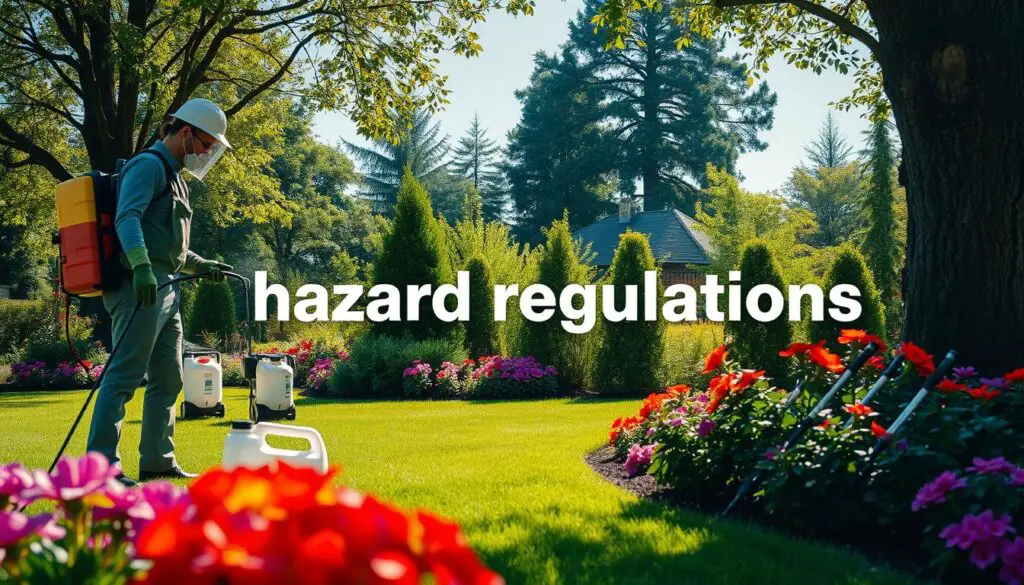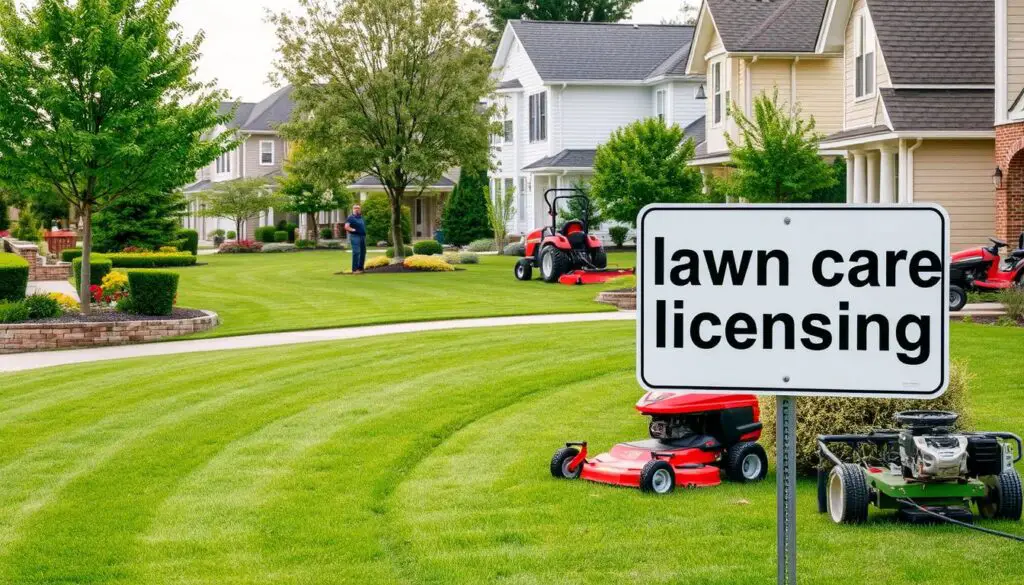Understanding Lawn Care Regulations in Your Area

The lawn care industry is booming, with a 6.4% growth in landscaping services by 2030. It’s vital for professionals to keep up with changing laws. These laws cover everything from fertilizer use to grass height and landscape rules.
This article will cover key regulations and licensing needs for lawn care pros. Knowing lawn care regulations, fertilizer laws, and pesticide restrictions helps your business run legally and ethically. By grasping these rules, you can grow your lawn care company while protecting your customers and the environment.
Key Takeaways
- Many states require landscaping contractors to hold professional licenses. Some need experience, courses, or exams.
- Getting a lawn care business license is often cheap, with low fees in most states.
- Licensing shows your skills and experience. It gives you a competitive edge and can boost your earnings.
- Licensing rules vary. They might include experience, courses, exams, insurance, and bonds.
- Some states need business owners to get a license, even if they don’t require it for lawn care.
Importance of Lawn Care Licensing and Certification
Getting the right lawn care licenses is crucial for a successful business. Laws vary by state, but most require you to register your business. Many also need landscaping contractors to have professional licenses. These licenses and certifications bring many benefits to your lawn care business.
Legal Compliance
Following lawn care licensing rules keeps your business legal. It helps you avoid fines and shows you’re committed to doing things right. Staying legal lets you focus on providing top-notch service to your clients.
Customer Confidence
Licensing and certification show your business is professional and reliable. This can help you attract and keep customers. It sets you apart in a competitive market.
Competitive Advantage
Having the right licenses and certifications gives you an edge. Customers are more likely to pay more for licensed services. Some contracts require licenses, reducing competition.
Investing in licenses and certifications boosts your business’s legality, trustworthiness, and profits. By following local laws, you set your business up for success and growth.
OSHA Lawn Care Regulations for Pesticide Applicators
As a lawn care pro, knowing OSHA rules is key to keeping you and your team safe. OSHA rule 1910.132 says employers must give all needed PPE. This includes safety glasses, gloves, and protective clothes for mixing and applying lawn chemicals.
Personal Protective Equipment
Wearing the right PPE is vital when using pesticides. You’ll need at least:
- Safety glasses or goggles to protect your eyes
- Chemical-resistant gloves to keep your hands safe
- Long-sleeved shirts and pants to cover your skin
- Respirators or masks to block harmful fumes and particles
Hazard Communication
OSHA also makes sure lawn care workers know the dangers of chemicals. They must learn how to read and follow mixing instructions. This training helps your team understand risks and stay safe.
“Protecting the safety and health of lawn care workers is our top priority. OSHA’s regulations provide a clear framework for ensuring proper training and equipment to mitigate the risks of pesticide exposure.”
Following OSHA’s OSHA regulations for lawn care shows you care about safety. It also reassures customers that you value your team’s and community’s well-being. Keeping up with these rules and providing the right personal protective equipment for lawn care and hazard communication for lawn chemicals is crucial for a safe and compliant business.

EPA’s Standards for Certification of Commercial Applicators
As a lawn care pro, following EPA rules is key. The EPA has strict rules for certifying commercial pesticide applicators. This includes me and my team, who use professional lawn chemicals on other people’s lawns.
The EPA wants us to know a lot about several important topics. These include:
- Pesticide label and labeling comprehension
- Pesticide safety
- Pesticides in the environment
- Pest identification and management
- Pesticide formulations
- Application equipment and techniques
- Relevant laws and regulations
Keeping our EPA certification up to date is crucial. We also need to keep training our team in pesticide applicator training. This keeps us legal, builds trust with customers, and helps us stand out in the market.
| Statistic | Value |
|---|---|
| Approximate number of commercial pesticide handler employers | 200,000 |
| Maximum civil penalty for unintended FIFRA violation (commercial entities) | $5,000 |
| Maximum civil penalty for willful FIFRA violation (commercial entities) | $25,000 and/or 1 year of jail time |
“Maintaining EPA lawn care chemical application certification is essential for my business to stay compliant and deliver the best service to our customers.”
Lawn Care Regulations and Licensing Requirements by State
As a lawn care pro, you must understand state and local laws. Licensing rules differ across the U.S. and even within states. Knowing these rules helps your business run legally and smoothly.
In some places like Colorado and Connecticut, you don’t need a state license for basic services. But, other states like Alabama, Alaska, California, and Hawaii require special licenses. Florida and Illinois need a commercial pesticide license for lawn care with pesticides.
Getting a license involves paperwork, application fees, and waiting for approval. This can take weeks. Landlords and managers should check local laws to hire lawn care services legally.
| State | Lawn Care Licensing Requirements |
|---|---|
| Alabama | Landscaping contractors must pass a test for related licensure; commercial pesticide applicator license required for certain activities |
| Alaska | $10,000 surety bond and insurance coverage required for landscaping companies; pesticide applicators must pass exams |
| California | C-27 Landscaping Contractor license required, with at least four years of experience and mandatory insurance coverage |
| Colorado | No state license required for basic landscaping services, but licensing may be required at the local level |
| Connecticut | No licensing or certification requirements for landscaping work |
Knowing state lawn care regulations and state lawn care licensing helps your business. It ensures you follow the law, builds trust with customers, and gives you an edge in the market.

“Navigating the complex web of local lawn care ordinances and municipal lawn care rules is essential for the success of any lawn care business.”
Lawn Care Regulations for Fertilizers and Pesticides
Concerns about chemical lawn care products are growing. Governments are making rules to keep us safe. The Environmental Protection Agency (EPA) has put limits on Restricted Use Pesticides (RUPs). These can’t be bought by everyone and must be used by trained people only.
Restricted Use Pesticides (RUPs)
The EPA checks all RUPs to protect us and the environment. Some places have their own rules for lawn care fertilizer regulations and lawn care pesticide regulations. For example, St. Johns County in Florida made laws about fertilizers years ago.
Sarasota County, Florida, has a fertilizer law. It limits nitrogen use and bans it during hot months. Phosphate use is also limited. You need a license to apply fertilizers, which involves a test.
These strict rules are hard for the industry. But, they’re needed to protect our environment. Experts say we’ll see even more rules soon.
“Nutrient loading into Florida’s surface and ground waters is a significant water quality issue in the state, and fertilizers applied to urban landscaping are a major source of nutrient loading.”
Florida is pushing for greener landscaping. They want to use safer fertilizers. They’ve made rules to stop pollution from lawns and landscapes.
lawn care regulations in Residential Areas
As a lawn care pro, you must understand the rules for residential lawns. State and federal laws are just the start. Homeowners’ associations (HOAs) and local laws also shape lawn care rules.
Homeowners’ Association Rules
HOAs have strict rules to keep neighborhoods looking good. They might dictate grass length, weed control, and landscaping. Using the wrong equipment or products can lead to fines.
Municipal Ordinances
Local laws also play a big role. They cover things like grass height, edging, and when you can mow. Knowing these rules is key to avoid fines.
Staying up-to-date with local lawn care rules helps lawn care pros. It ensures they meet all requirements. This keeps the business safe and helps neighborhoods look their best.
Lawn Care Business Registration and Licensing
Starting your lawn care business means understanding the rules of registration and licensing. These steps are key to following the law and setting up a strong base for your business.
Choosing a Business Structure
First, pick the right business structure for your lawn care business. This choice affects your taxes, liability, and how you run your business. You might choose from sole proprietorship, partnership, LLC, or corporation. Think about what each offers to find the best for you.
Tax Registration
After picking your structure, get the tax IDs you need. This includes a federal EIN and any state or local IDs. Getting these IDs right means you follow the law and can run your business legally.
You might also need special licenses or permits to work in lawn care. Getting these involves showing legal documents, passing tests, and paying fees. Make sure to check the rules in the places you’ll work.
By understanding and meeting the registration and licensing needs, you’re setting up your business for success. This is a crucial step for growth and staying compliant.

“Proper licensing and registration are not just legal requirements, but also a testament to your professionalism and commitment to providing high-quality lawn care services.”
Continuing Education for Lawn Care Professionals
As a lawn care pro, it’s key to keep up with new practices, laws, and needs. Continuing education helps you do this. It’s vital for quality service, following rules, and staying ahead in the lawn care industry.
The Professional Grounds Management Society has two certifications: Certified Grounds Manager (CGM) and Certified Grounds Technician (CGT). The International Franchise Association also offers education. They cover topics like Marketplace Fundamentals, Knowledge-Driven Financial Performance, and Cash Flow Management.
The National Association of Landscape Professionals is great for continuing education for lawn care pros. They have many learning chances, some just for members. You can get certified in things like landscape industry certified manager and landscape industry certified technician–exterior.
Many states require a license for lawn care pros who use pesticides. This means passing a test on safe chemical use. It’s for professional development for lawn care and following the law.
“Pursuing additional certifications and industry credentials can also help lawn care companies stand out and attract higher-paying clients.”
Future lawn and gardening service owners should get field experience. Try internships or part-time jobs with lawn care companies, golf courses, and public gardens. Good owners have people skills, motivation, sales talent, attention to detail, and health for the job’s physical demands.

By getting lawn care industry certifications and keeping up with new trends, pros can improve their skills. This leads to better service and success for their businesses.
Best Practices for Lawn Care Companies
As a lawn care pro, I’ve learned to stay ahead by using lawn care business software. It makes our work easier and our service better. This software helps us manage inventory and create invoices anywhere. It makes us look good to our clients.
Using tech is just part of the job. Networking with other lawn care pros is also key. Going to local events or joining groups like the National Association for Landscape Professionals (NALP) keeps me in the loop. It also helps me find new clients and partners.
Success in lawn care means following the rules and keeping customers happy. I keep my team updated on new rules and best practices. This way, we always meet expectations and grow our business.
FAQ
What are the essential lawn care regulations and licensing requirements that every lawn care professional needs to know?
What OSHA regulations do lawn care professionals need to follow when mixing and applying professional lawn care chemicals?
What are the EPA’s requirements for commercial applicators of lawn care chemicals?
How do Restricted Use Pesticides (RUPs) affect lawn care professionals?
What other lawn care regulations do lawn care professionals need to be aware of?
What steps are involved in starting a lawn care business and obtaining the necessary licenses?
How can lawn care professionals stay up-to-date on industry requirements and best practices?
Source Links
- https://www.fieldroutes.com/blog/lawn-care-business-licenses
- https://www.spyker.com/blog/lawn-chemical-restrictions-lawncare/
- https://insights.workwave.com/industry/lawn-landscape/how-to-make-your-lawn-care-business-legal/
- https://www.yourgreenpal.com/blog/do-i-need-a-license-to-run-a-lawn-care-business
- https://www.youraspire.com/blog/what-licenses-are-needed-to-start-a-landscaping-business
- https://www.coohom.com/article/is-landscaping-covered-by-osha
- https://www.codepublishing.com/MD/TakomaPark/html/TakomaPark14/TakomaPark1428.html
- https://www.ecfr.gov/current/title-40/chapter-I/subchapter-E/part-170
- https://rvpadmin.cce.cornell.edu/uploads/doc_546.pdf
- https://gomow.com/blog/the-complete-guide-to-landscaper-licensing-requirements-by-state-usa/
- https://www.bobvila.com/articles/how-to-get-a-landscaping-license/
- https://www.lawnsite.com/threads/florida-fertilizer-regulations.253291/
- https://ipm.ifas.ufl.edu/pdfs/florida_friendly_landscape_guidelines_CCR_1-09(1).pdf
- https://www.fdacs.gov/content/download/3502/file/Fertilizer_Registration_and_Labeling_Guidelines.pdf
- https://www.codepublishing.com/WA/Wilkeson/html/Wilkeson17/Wilkeson1706.html
- https://www.townofpalmbeach.com/1067/Construction-Hours-and-Regulations
- https://www.oldhamcountyky.gov/sites/default/files/pdf/DIVISION 300 Landscaing Regulations APPROVED 08 06 2019_0.pdf
- https://www.briostack.com/blog/lawn/license-requirements-for-lawn-care-business
- https://www.nextinsurance.com/blog/landscaper-licensing-requirements/
- https://vault.com/professions/lawn-and-gardening-service-owners/requirements
- https://cpe.rutgers.edu/landscape/landscape-management-certificate
- https://connecteam.com/successful-lawn-care-business-rules/
- https://www.spyker.com/blog/licenses-needed-to-start-a-lawn-care-business/

